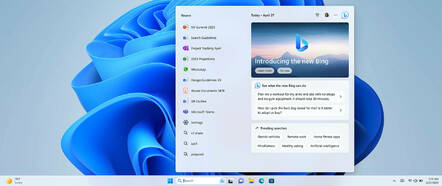This article is more than 1 year old
'Major' news: Microsoft slips Bing chatbot shortcut into Windows 11
Celebrated, unhinged search tool pushed in latest OS update
Microsoft is continuing its efforts to foist upon us its controversial OpenAI-powered chat-driven Bing search bot.
Redmond last month rolled out a preview of its Bing chatbot to much hype and criticism. With the latest updates to Windows 11 this week, Microsoft is partially building it into the year-old operating system, basically making the AI-based Bing search available as a shortcut from the Windows taskbar.
Typing a question into the taskbar's search box and clicking on a Bing icon will take you into Edge to interact with the bot on Bing.com, which may or may not answer your queries usefully. This is assuming here you have access to the bot, which is available in limited public preview. The Windows Search pane also has links to the bot on Bing's website.
The software giant heralded this as a "major step forward."
"Soon hundreds of millions of Windows 11 users can get access to this incredible new technology to search, chat, answer questions and generate content from right on their Windows taskbar," Panos Panay, Microsoft's chief product officer, gushed in an announcement.
The IT colossus has placed an enormous bet on artificial intelligence, investing billions of dollars into startup OpenAI – the creators of GPT, ChatGPT, and other natural language AI tools – and aggressively pushing the technology into its products, from Teams to Edge and Skype.
In February, Microsoft said it also was bringing the Bing chatbot into the mobile arena, including iOS and Android apps.
In addition, the company is continuing to push AI into the cloud. The same day it announced the appearance of the Bing chatbot widget with Windows 11, Microsoft said it is bringing more AI-powered features to Teams Premium and the Viva employee engagement service.
Teams Premium features OpenAI's GPT-3.5, the latest version of the language model. Teams Premium includes intelligent recap, a feature that uses AI to suggest action items and who's responsible for them to ensure they are followed up and creates recordings after the meeting that include automatically generated chapters and insights, from when a person's name was mentioned to when a screen was shared.
Other features coming in the next few months will include AI-generated notes to deliver key points from a meeting and tasks that will create and suggest action items, according to Colette Stallbaumer, general manager of Microsoft 365 and Future of Work.
- Seeing as GPT-3 is great at faking info, you should lean into that, says Microsoft
- Cause for a LLaMA? Meta reckons its smaller text-emitting AI is better than rivals
- Microsoft begs you not to ditch Edge on Google's own Chrome download page
- Microsoft injects AI search into Bing, Edge, Skype apps
Microsoft CEO Satya Nadella last month told CNBC that AI-infused search is the biggest innovation to come out of the company during his nine years at the helm and the most important since the late 2000s and the rise of cloud computing.
The biz has pushed the importance of competing with rivals on the AI front, in particular Google. Google is working on Bard, its own AI-powered search technology, and others like Baidu and Tencent are making similar moves.
While ChatGPT – which is trained on the internet – quickly captured the public's imagination with the fast text responses to written questions, it also has been criticized for inaccuracies and plagiarism. During a Microsoft demo last month, when asked to list the best nightlife spots in Mexico City, it found restaurants and bars but gave incorrect details.
Bing also has trouble handling longer conversations. To manage that, Microsoft limits the number of consecutive questions a person can ask and how many conversations they can start each day. However, the company is apparently working out the kinks in those areas.
Bard hasn't fared much better. During a demo last month, the AI chatbot got an answer wrong, with Google parent company Alphabet's market value taking a hit measuring more than $100 billion.
Expanding Windows 11 in the mobile universe
The Bing chatbot tease was only part of a number of new features in Windows 11. Another is Phone Link for iOS, a tool being previewed by Windows Insiders that will let iPhone users directly link their device to Windows 11 PCs.
That means iPhone users will be able to make and receive calls as well as view iPhone notifications and send/receive texts from their PCs.
It's part of a larger effort by Microsoft to expand Windows 11 in the mobile space. In November 2022, Microsoft integrated iCloud Photos into Windows 11's Photos app, making it easier for iPhone users to view those photos on their PC.
Microsoft already offered Phone Link capabilities to Android users and now is making it easier for Samsung users to activate a personal hotspot via a single click within the Wi-Fi network list on a Windows PC. They can also more easily transfer their browser sessions from their smartphone to PC. ®

